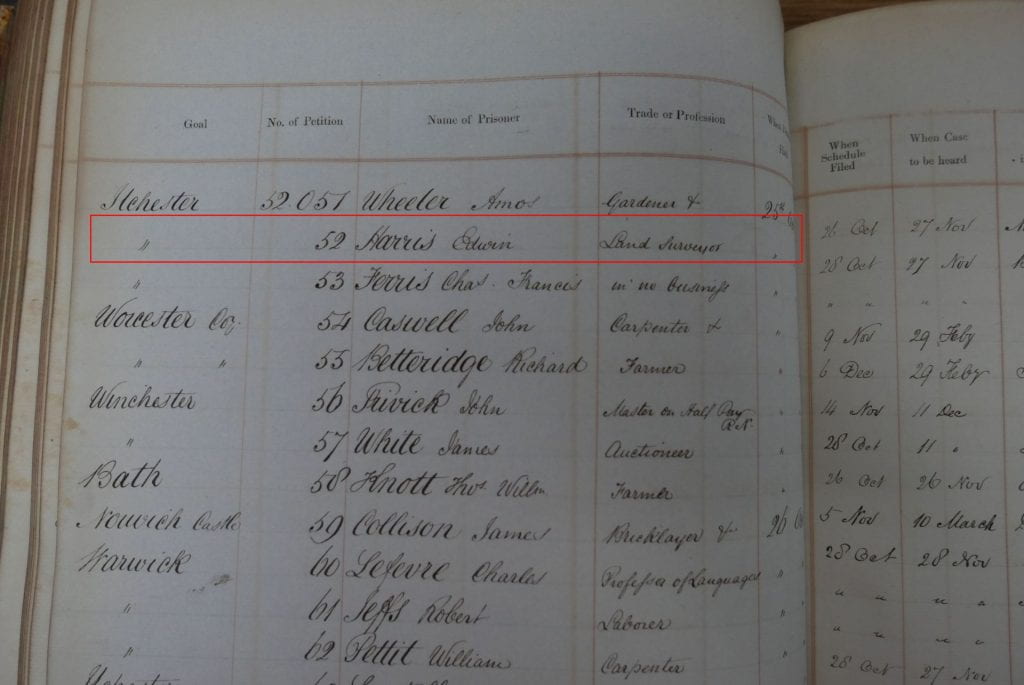The clue was staring at us all along. Edwin’s youngest sister Ellen Susan Harris, writing to New Zealand in 1842, gives an insouciant account of leaving her position as a governess and then continues with family news:
But I will say no more of myself as I think you will be better pleased to hear of the movements of the more important branches of the family and now I think I will tell you about Mr Stephen Court. Aunty told me just now that she had mentioned to you in her letter of his being in difficulties but he contrived to surmount them in a gentlemanly way very common now-a-days by taking a comfortable trip to Ilchester Mansion (where a certain friend of yours Henry Paddon the auctioneer has been paying a visit also). (17 Jan 1842)
We spent some time trying to find Ilchester Mansion, without success, and wondered who Henry Paddon the auctioneer might be. When Nigel Overton’s searches for Edwin Harris in Plymouth turned up a notice of insolvency in 1839, we were on the way to solving both mysteries. After tracking down a case file number we were able to find more details in a volume at the National Archives listing insolvencies in England 1838-40. This is what we found:
Gaol: Ilchester
No of petition: 52,052
Name of Prisoner: Harris, Edwin
Trade or profession: Land surveyor
When petition filed: 25 Oct
When schedule filed: 28 Oct
When case to be heard: 27 Nov
Attorney in the case: Boydell
Commissioner’s Adjudication, or Magistrate’s Certificate, and when made: 27 Nov
Actual Discharge when to take place: fwth
Remarks: Jas (?) Dale/4/ Asee (?)
Edwin spent at least a month in the debtors’ prison at Ilchester, Somerset, while his financial troubles came to court. The record does not show whether he was there with wife and family, and it is possible that Sarah left the village of Dulverton, Somerset, where her third child Catherine was born in June 1839, and returned to Plymouth with her three children to wait for Edwin’s release. All five Harrises were living with Edwin’s parents in Union St by 18 March 1840, when Emily and Catherine were baptised at Charles Church. It seems likely that the insolvency was directly responsible for Edwin’s decision to emigrate and it is unsurprising that brother-in-Law JM Rendel’s letter of recommendation to Lieutenant-Governor Hobson in New Zealand omits to mention the episode. We can only imagine the impact of the insolvency and the court proceedings on Edwin and Sarah and note that such events will touch the family at least once more according to Ellen Harris’s 1842 mention of Stephen Court’s difficulties.
But who is Henry Paddon the auctioneer and friend of Edwin Harris? We could find nobody of that name and profession and had given up the search. But Ellen’s wry description of Ilchester gaol as a mansion made us think again about Mr Paddon and wonder whether she is referring to Francis William Paddon, the brother-in-law who was responsible (according to Sarah) for the family’s financial ruin. We took another look at Sarah’s account of events just prior to emigration in the memoir written for her adult children many years later:
Catherine was born in Somersetshire, Dulverton, where we were two years during the surveys made by your father for the Reform Bills. Your father had been all through the County of Cornwall with the Commissioner Dawson for the same purposes. We were prospering and likely to do so but for a very unexpected trouble in a will, concern which to oblige a brother in law of mine whose dishonourable conduct quite ruined us at this time. (1871)
Francis Paddon is a shadowy figure, in and out of bankruptcy in the 1830s, 40s and 50s. His business activities include auctioneering (dealing), so perhaps Ellen Harris’s Henry Paddon and Francis Paddon are indeed one and the same. Nothing we have found to date indicates exactly what went wrong for Edwin Harris in 1839 but it is significant that in April of the same year Francis William Paddon, Common Carrier, Commission Agent, Consignee, Dealer and Chapman, was embroiled once again in bankruptcy proceedings:
Whereas the Commissioners acting in the prosecution of a Fiat in Bankruptcy awarded and issued forth against Francis William Paddon, of Plymouth, in the county of Devon, Common-Carrier, Commission-Agent, Consignee, Dealer and Chapman, have certified to the Right Hon. the Lord High Chancellor of Great Britain, and to the Court Of Review in Bankruptcy, that the said Francis William Paddon Until in all things conformed himself according to the directions of the Acts of Parliament made and now in force concerning bankrupts ; this is to give notice, that by virtue of an Act, passed in the sixth year of the reign of His late Majesty King George the Fourth , intituled “An Act to amend the laws relating to bankrupts; ” and also of an Act, passed in the first and second years of the reign of His late Majesty King William the Fourth, intituled “An Act to establish a Court in Bankruptcy,” the Certificate of the said Francis William Paddon will be allowed and confirmed by the Court of Review established by the said last-mentioned Act, unless cause be shown to the said Court to the contrary on or before the 26th-day of April 1839. (London Gazette 5 Apr 1839)

Lead writer: Michele Leggott
Research support: Makyla Curtis, Betty Davis
Fascinating! I think you are right in surmising that the humiliation of debtor’s gaol would have precipitated emigration.